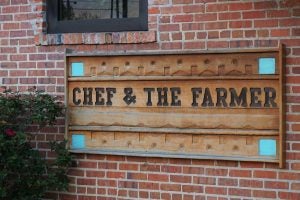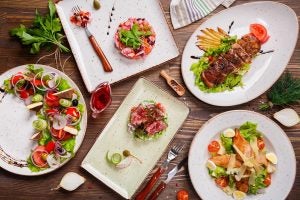This op-ed was submitted by Jessica Gigot and is a response to a New York Times opinion piece titled, Foodie Fever Dreams Can’t Keep Restaurants Afloat, which explores closures of high-end dining establishments.
A farce can be defined as “a ridiculous situation or event, or something considered a waste of time.” Or “a comic dramatic work using buffoonery and horseplay and typically including crude characterization and ludicrously improbable situations.” I have to laugh when I think about the word farce in relation to various iterations of farm-fresh food promotion, or more specifically, farm-to-table dining experiences. This was portrayed in Portlandia‘s hilarious Colin the Chicken skit? Was that funny because it was ridiculous or not that far from the truth? I am still not sure.
My interest as a farmer and an eater (who loves restaurants!) was piqued by Vivian Howard’s recent New York Times guest essay Foodie Fever Dreams Can’t Keep Restaurants Afloat. I knew the pandemic was rough for many restaurants, but the long-term fragility of this industry has come to the forefront over the past few years. Restaurant closures as well as disturbing exposés of star chefs, like Blaine Wetzel and Dan Barber, have brought into question the viability of the industry, especially the higher-end sector dedicated to featuring local goods on seasonal menus.
As Howard states, “The pandemic merely made obvious the archaic and limited nature of our gerbil wheel of a business model.”
In her provocative piece, I noted that a nod to farmers was notably absent, which is odd because her first restaurant was called Chef & the Farmer and her PBS series, A Chef’s Life, showcased a cadre of farmers in her community. If the restaurants advocating for hyperlocal aren’t making it and haven’t been paying their employees well, or at all, then how have they been treating their farmers? Or are restaurants sourcing local, high-quality food in the red exactly because in part they have been paying a fair price for cheese, meat, and produce?

From the artfulness of presentation to the creative flavor combinations, it continues to be an honor to be featured by local chefs, and I am in awe of what they can make with our product. However, what the chef/farmer relationship comes down to in the end is just that: honor. Not money or secure livelihoods, but bucket loads of honor for doing the right thing, working hard, and making beauty in the world.
What Howard is calling out here, unfortunately, is that this all has to change. The idealistic goals of farm-to-table dining, or innovative restaurants in general, have failed everyone involved except maybe the eater? Farm-to-table can’t exist without the farm, and despite their best efforts to celebrate the land on the plate, what Howard and several other chefs are telling us is that it is a farce: A ludicrously improbable situation. Possibly a waste of time?
In September, I wrote an op-ed for The Seattle Times about the challenges many new and small farms are facing, especially as climate-change-related disasters escalate. For me, farm-to-table dining was about transparency, education and sharing all the details of how a tomato (or Colin the Chicken for that matter) came to be with the hopes that diners would spend more and farmers would get paid more and chefs could be the champions of this whole ménage à trois relationship. However, the end result has been increased shielding, secret slivers of Costco-bought cheese added to “local” cheese plates, California greens showing up on seasonal salads around the country. Margins make you do miserable things, and that is one of the reasons I find farming, like operating a restaurant I imagine, so hard too.
I have never worked in a restaurant, but I assume that from front to back of house, the work is very demanding. I will confess I had to turn off FX’s TV show The Bear minutes in because I just couldn’t deal. I am nowhere near emotionally ready to watch HBO’s The Menu. Not to be cheeky, but have you tried farming? It is extremely difficult, and there are rarely any tips. Actually, no, there are never any tips. I really can’t cut corners — I don’t want to exploit my land or my animals, and if the wealthiest eaters in Seattle, or any other big city, can’t see this (or save the delicate farm-restaurant continuum with their purchasing power) then what is next?

Farm-to-table is not a bad idea at its core. Making connections between agriculture and eaters is important, and at the risk of sounding trite, I will reiterate the most quoted of all Wendell Berry quotes. “Eating is an agricultural act.”
Chefs play an important role in educating eaters about farming. I will forever be a fangirl of Alice Waters, Renee Erickson, and Vivian Howard — female chefs who have had success in both restauranting, enlightening customers, and valuing employees. So how do we save restaurants and the farms that need them? How do we collectively take apart this broken system of serving food and start anew? Perhaps elevated take-out or more pared down, pop-up style dining, as Howard suggests, is the key? The conversation needs to extend from field to plate to be sustainable.
Let’s make sure that the efforts on the field side of things — to conserve soil health and habitat, raise animals under just standards, and grow nutrient-dense food — do not become the farce, because that would, indeed, be devastating.
Jessica Gigot is a poet, farmer, and writing coach. She lives on a little sheep farm in the Skagit Valley in Washington State. Her second book of poems, Feeding Hour, won a Nautilus Award and was a finalist for the 2021 Washington State Book Award. Her writing and reviews appear in publications such as The New York Times, Seattle Times, Orion, Terrain.org, and Ecotone, Poetry Northwest. Her memoir A Little Bit of Land was published by OSU Press in 2022.


